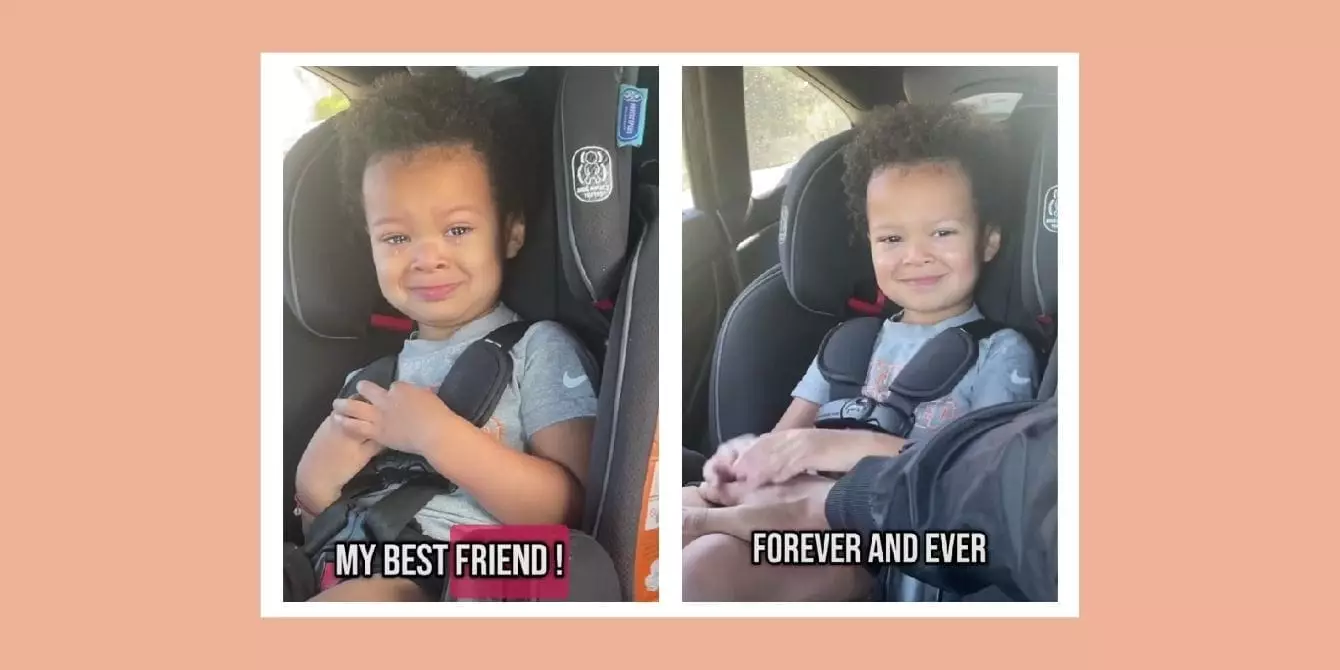In a society where emotional expression among men is often relegated to quiet corners, a heartwarming TikTok video featuring a dad and his toddler son has taken the internet by storm. The creator, @Micahzanesworld, captures an intimate moment in which the father tells his son, “You’re the best son ever! Forever and ever, I’ll be your daddy.” This genuine display of affection showcases not just the love between a parent and child but doubles as a powerful statement on modern masculinity. The tenderness in this affirmation sends ripples beyond its immediate context; it resonates deeply with viewers, breaking stereotypes and opening dialogues about emotional expression among fathers.
The staggering number of views—over 4.1 million—along with the supportive comments from viewers, hint at a collective hunger for a new narrative surrounding fatherhood. This moment transcends mere cuteness; it is deeply rooted in a cultural shift toward emotional honesty and vulnerability. Many men, typically discouraged from expressing emotions, find both solace and empowerment in these snippets. The powerful yet simple act of telling a child they are loved can have transformative effects, not only on the child’s emotional well-being but also on the father’s own experiences and understanding of gentleness.
The Generational Ripple Effect
The backdrop of this video reveals an inherent struggle faced by many fathers: the desire to do better than the previous generation. For dads who grew up in families where expressions of affection were scarce or hidden behind stoicism, providing affirmation feels revolutionary. Comments like those from @Ms. Dee highlight this phenomenon, noting that the father embodies what he perhaps craved in his own childhood. This is not just a solo act of vulnerability but rather a collective healing of sorts—a chance to rewrite history and forge a new familial legacy rooted in love, understanding, and communication.
Research from the Greater Good Science Center suggests that the outcomes of such tender affirmations are significant. Sons who receive warmth from their fathers are likely to experience not only higher self-esteem but also improved social skills and emotional intelligence. The evidence points to a positive correlation between a father’s affectionate behavior and the emotional development of their children, demonstrating that showing love and affirmation is not an indulgence but a necessity for strong parent-child relationships. It reassures children that it’s acceptable to display vulnerability, allowing these young boys to grow up as compassionate and emotionally aware men.
Emotional Literacy: A New Dimension of Masculinity
As the video circulates, many viewers commend the father for normalizing emotional expression. Comments share thoughts on the importance of allowing boys to feel, empathize, and express love—a stark contrast to the pervasive “big boys don’t cry” mentality. This displays a significant shift; rather than stifling emotions, this father exemplifies that masculinity and emotional sensitivity can coexist. Spencer, a viewer who resonates with the content, emphasizes, “It’s OK for men to cry. It’s OK to have emotions.” His belief encompasses a broader vision of masculinity—one that celebrates nurturing as an integral part of being a father.
This cultural transformation is palpable in the comments sections, often resembling a support circle. Viewers share their own emotional journeys, affirming the nuances of fatherhood and encouraging one another to break away from past paradigms. Comments praising the toddler’s burgeoning emotional intelligence and predicting his development into a loving adult further reflect how this moment is perceived as an awakening. It is a rare and beautiful synthesis of love and masculinity, paving the path toward a future where emotional literacy is commonplace among boys and men alike.
A New Era of Intentional Fatherhood
The quiet moments in cars and kitchens become profound intersections of love and learning, informing future generations about the importance of emotional expression. This father is more than just a role model for his son; he is part of a larger movement redefining what it means to be a father. Instead of perpetuating cycles of emotional suppression, he is fostering a generation who understands the balance between strength and vulnerability.
It’s crucial for contemporary society to validate these kinds of fatherhood narratives, highlighting that men can embody protectiveness and tenderness simultaneously. By openly showcasing vulnerability, fathers become vital agents of change who challenge outdated stereotypes, promoting an emotional landscape that helps not just their children but society at large. The strength born from this positive affirmation nurtures emotional growth, fosters resilience, and lays the groundwork for future fathers to carry on these values, completing a full circle of compassion, understanding, and love.

